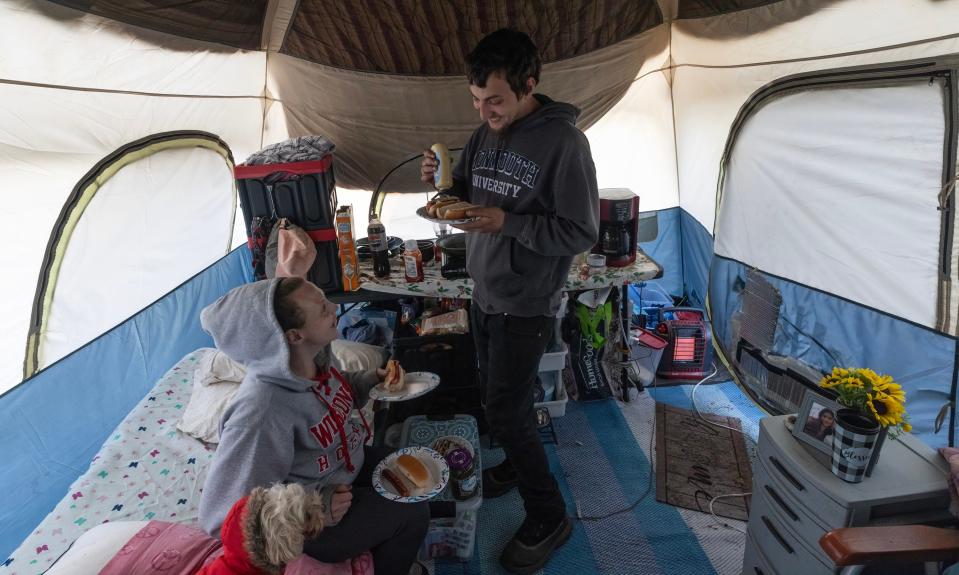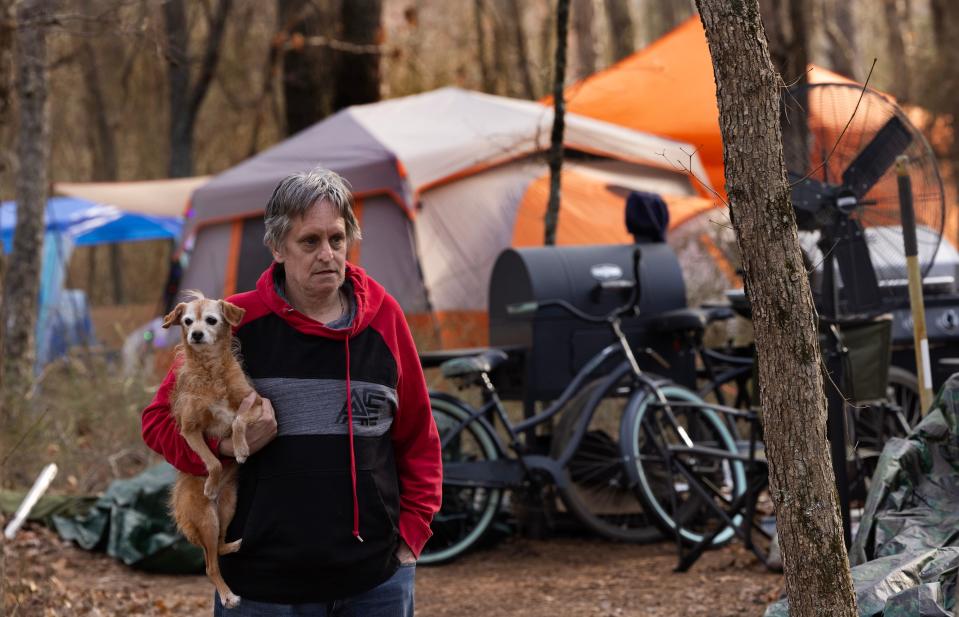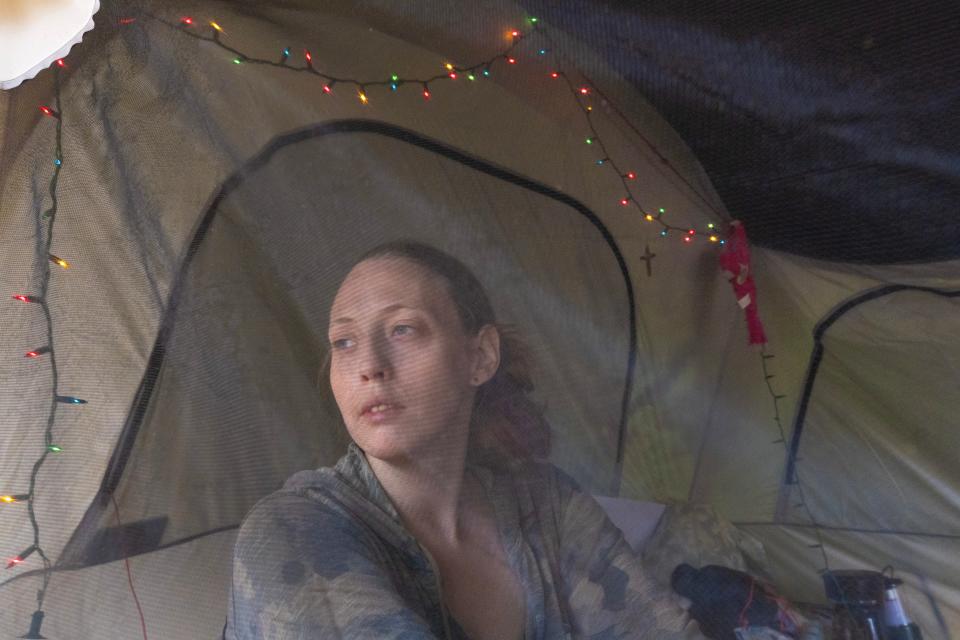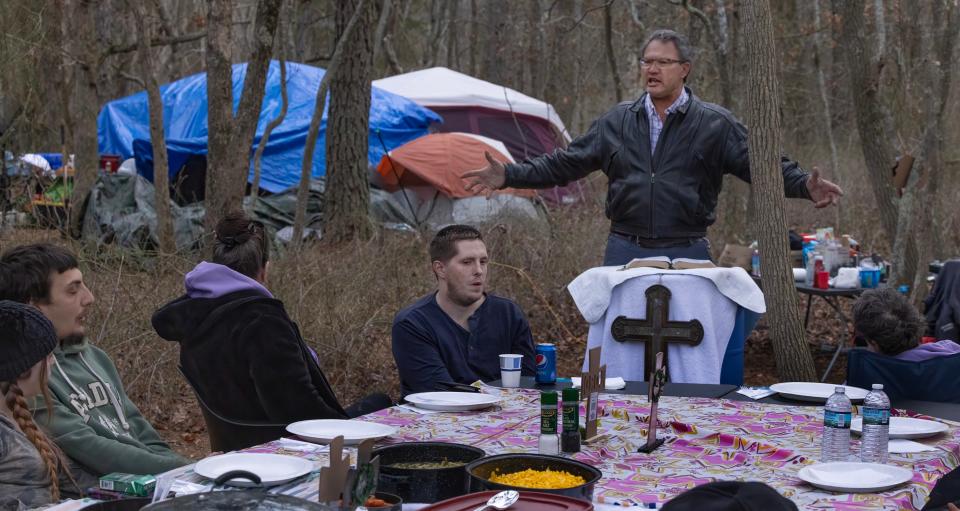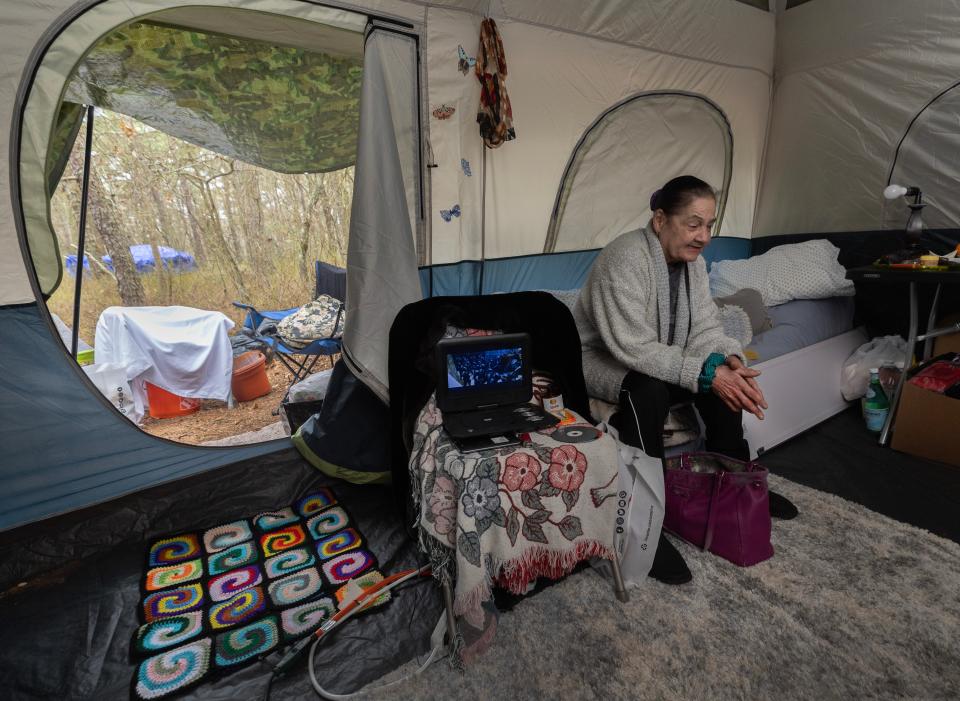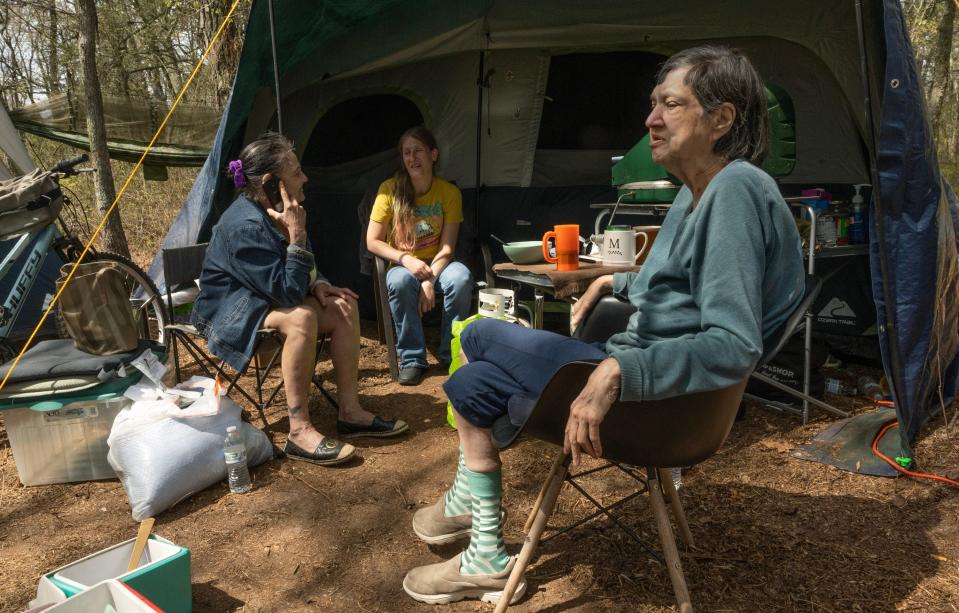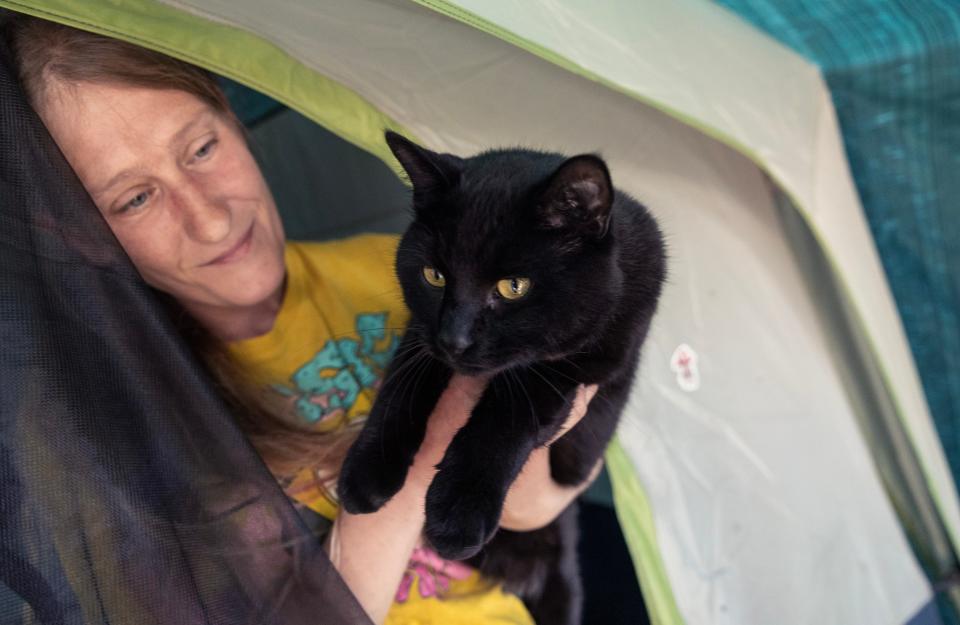In the Toms River woods, homeless tell their stories
(Editor’s Note: This story originally published in May 2024.)
TOMS RIVER – Melissa McLean ticks off the series of jobs she’s had: there was a newspaper route, data entry, work behind the counter at a Matawan restaurant. Most recently she cared for her 94-year-old mother, who is now in a nursing home.
It was her mother’s move to the nursing home from Lakewood’s Leisure Village East that left McLean, 64, without a home of her own; she had given up her own apartment to move in with her mother. For the past year, she’s been living with her fluffy little dog, Susie, deep in the woods of Winding River Park.
McLean is one of about 20 people occupying the wooded tent camp, founded and supplied by Minister Steve Brigham of Destiny’s Bridge, an advocacy organization that assists those experiencing homelessness.
“They blame the homeless for living in the woods, but they should be helping them,” Brigham said on a recent day, as he brought in supplies, including propane, for the campers. Ocean County is the only county in the state without a transitional shelter for the homeless; the county Board of Commissioners reiterated recently that there are no plans to build such a facility.
The county does provide financial support for numerous organizations that assist those without a home, and last year instituted a homelessness trust fund, which is expected to raise between $275,000 to $390,000 annually. That money will be used to support programs to prevent people from becoming homeless.
About 10,270 New Jerseyans were living without a home in late January 2023, according to a “point in time” count by Monarch Housing Associates. That’s a 17% increase over 2022, attributed in part to the lapse of eviction protections in place during the coronavirus pandemic, as well as increased costs for rent and food.
Susie cuddles up in the blankets as owner Melissa McLean relaxes and talks with another camper at the homeless camp in the Toms River woods. McLean’s tent is often a gathering place for conversation, since she has a coffee pot.
“When I became homeless, at first I was on my own, living in my car,” McLean said on a chilly recent day, as Susie sat alongside her on the cot in her tent. “I was camping at Turkey Swamp Park.” She met Brigham at Allaire State Park in Wall, right when she was running out of money.
“It was $40 a night just for a camp site,” she said. Brigham told her about the Winding River camp, and McLean moved out into the woods. She’s on disability after suffering a stroke that kept her hospitalized for 10 days, but in the camp, she likes to stay busy.
Pictures of grandchildren on the nightstand
McLean makes coffee in her Mr. Coffee machine and cooks on a hot plate in her tent. There’s a fire pit outside, where other residents like to stop by to sit during the evening. A young couple, Kayla and John, recently stopped by for coffee and to cook hot dogs on the hot plate.
More: Which New Jersey towns will sink under water from sea level rise? Find out on this map
John makes some hot dogs with his girlfriend Kayla as they visit Melissa McLean’s tent. McLean’s tent at the homeless camp in the woods of Toms River is meeting place for coffee and conversation, and other campers stop by to talk and relax.
Pictures of her three grandchildren are on her nightstand, in a picture frame that reads, “Simply the Best Grandmom.” Her daughter is a district manager of a local restaurant chain, and McLean occasionally stays with her. But her daughter has a small one-bedroom apartment, and there is not a lot of room. On trees outside, residents have put bird feeders and a hummingbird feeder. McLean said she was excited recently to see one hummingbird taking a drink of nectar.
“There are wonderful people here,” she said. “Minister Steve is great. He takes care of us.” Next to her tent, her cousin, Jimmy Forbes, 58, who grew up in Staten Island and Hopatcong and lived in North Brunswick, recently moved in with his small, feisty dog, Molly.
Forbes, who suffers from severe allergies and asthma, found himself without a home after his mother passed away. “I wanted to move closer to where she was,” Forbes said of McLean. Molly, who is nervous, growls and barks at strangers, but Forbes laughs that her bark is the only threatening thing about her.
Jimmy Forbes, 58, a resident of the Toms River homeless camp, moved to the camp there when he couldn’t afford regular housing, and learned of the camp from his cousin Melissa McLean, who had moved there.
Like many of the residents of the Winding River camp, Forbes and McLean are dedicated to their pets, even though having a dog or cat makes it more difficult for them to find permanent housing. Many landlords won’t rent to people with pets, or they charge fees for dog or cat owners that make already expensive rents unaffordable for many potential tenants.
Residents use bicycles to leave the camp, doing shopping at nearby stores and washing their laundry. So many people donated clothing, blankets and other items to campers that for a while, the entrance to the campground was lined with piles of wet clothes, discarded boxes and bags, and even some rotting food. Brigham and the campers have cleaned up the mess, with the help of a dumpster used to dispose of the unneeded goods.
Chickens roam the outskirts of the camp, providing fresh eggs and also some protection from the ticks and other bugs that bother campers in the summer months.
Paul Hulse, chief executive officer of Just Believe, said his group has gotten about five people from the camp into housing since the beginning of the year.
Case workers have gone to the camp to deliver mail to residents, hand out food products and water, and also Narcan, or naxolone, which can stop an overdose.
“We’ve been gridlocked out there,” Hulse said of the camp, noting that many of those living in the woods have been uneasy about working with those who visit the area. Just Believe has found housing for 114 people and nine pets since January, Hulse said, but has found few takers in the camp.
More: ‘Ignore the haters’: Marlboro woman with alopecia lost hair but found a community
Kayla looks at the warm weather outside as she takes a break from cleaning. The homeless in the camp in the Toms River woods enjoy the nice weather when they have it and take to their tents to wait out the bad as it comes. As the first warmer days of spring arrive, the homeless pull back the plastic coverings to let in some fresh air.
Living here for more than a year
Brigham has worked to create a sense of community among the campers. On Easter, he preached a sermon and helped prepare a feast, including slices of ham and pineapple. In warmer weather, he helps cook hamburgers and hot dogs on a grill near the center of the camp. He provides tents and portable heaters and hooks people’s tents up to the generator. A series of orange extension cords snakes through the wood-lined pathways.
Many of the campers have been in Winding River for well over a year. Advocates from groups such as Just Believe have frequently visited the camp, but many of those who live there say they are unwilling to move out of the woods unless they can find permanent housing. They often don’t feel safe in the motels they are placed in, and also complain of being bounced from one motel to another.
Brigham would like the county to consider turning the newly acquired Cedar Creek Campground, in Berkeley’s Bayville section, into a location for tiny homes.
“There are 90 slots that have electricity,” he said. “Tiny homes could be put in and it would be perfect.”
McLean said a group of women in the camp helps prepare meals, using crock pots to cook dinners like chicken and rice and lasagna with meatballs. The hum of a generator can be heard in the camp; housed in an orange tent, the generator helps power residents’ electronics and lights. It also helps camp members charge their cell phones and use computers to access the internet or play DVDs.
Rev. Steve Brigham delivers an Easter sermon and prayer before the homeless enjoy their Easter dinner at a camp in the woods of Toms River.
The winter was fairly mild, but during a couple of snowstorms, residents were out frequently, knocking snow off tents and canopies. They stay warm with portable “buddy heaters,” and pointed out that one of the benefits of winter is the lack of insects; ticks, mosquitoes and chiggers are a problem when the weather warms.
No family left
April Higgins, 62, is a Toms River native who has lived in the camp for about a month. A graduate of Toms River High School South, Higgins has set up two cots in her tent, using one as a couch. She watches movies on her laptop; the Harry Potter films are among her favorites.
Higgins said she has no living family left; she’s been on disability for about 20 years and needs hip replacement surgery. Before her hip became too painful, she worked in home health care; her mother had her own business.
Higgins has decorated the inside of her tent with stickers of butterflies and flowers, to make it more homey.
April Higgins talks about how she ended up living in the Toms River homeless camp and what life is like for her now. Higgins, 62, has been on Social Security disability for the past 20 years and needs a full hip replacement. Before she went on disability, she worked as a home health aide for years.
“There are no shelters for the homeless,” Higgins said. “Nobody cares. … There are so many motels that are empty, they could put people in there and let them work.”
Only a few steps from Higgins’ tent, a new family, the Augustinos, moved in about two weeks ago. Shannon Augustino, 35, said she previously lived in motels in Lakehurst and Seaside Heights before moving into the woods. Her father, Jeffrey Augustino, 62, previously worked for Middlesex County as a sewage treatment operator, and then had his own construction business.
But he was forced onto disability after neck surgery, a bout with colon cancer, and a hernia. His head is tilted because of degeneration of discs in his neck, making it almost impossible for him to stand up straight. His sister, Eileen, 73, has also moved into the woods; she cannot read or write and has been on disability her whole life, she said. Her brother described her as “mentally challenged,” but Eileen noted she can cook and clean and helps around the camp.
‘There are a lot of nice people here’
Jeff Augustino, 62, sits outside his tent in the Toms River homeless camp. Augustino can’t work because he has ruptured discs in his back that he couldn’t have repaired because he was already being treated for cancer.
“We are homeless for the first time in our lives,” Jeffrey Augustino said, standing outside the tent he was sharing with Shannon and Eileen. Brigham had set up another tent for the family, who were feeling a bit crowded sharing one small space, along with their three cats, Franklin, Mai-Mai and Georgie.
“It’s not as bad as I thought it would be,” Jeffrey said of life in the camp. “There are a lot of nice people here.”
Shannon is trying to train her black cat, Franklin, to walk on a leash, after the feisty feline figured out to open the zippers on the family’s tents and escaped at least twice, once luring Mai-Mai out with him. On a recent day, Shannon showed bloody scratches on her arms and legs from pursuing the cats into the sticker bushes where they fled.
Eileen Augustino, who is disabled, sits outside with her niece Shannon Augustino and neighbor April Higgins and enjoy the warm weather at the homeless camp in the woods of Toms River.
Jeffrey hopes to be able to leave the woods soon; he’s expecting a $30,000 payment for an on-the-job injury, and has his eye on a trailer in Vineland that he can purchase for $14,900, leaving enough to buy a car so that he and the family can move there. With his $1,600 monthly disability payment combined with his sister’s, he said he can afford to pay the monthly pad fee for the trailer.
“Hopefully, I’ll get that money very soon, and then we can move out of here,” he said.
Shannon Augustino, 35, holds up one of her cats that lives with her at the Toms River homeless camp.
‘I never expected to be living here’
Another new camper, Robert Adams, 68, also hopes he can leave the woods sometime soon. A retired nurse, Adams was caring for his mother in Jackson for the past six years, but she was recently moved to hospice and he lost his home. He shares his tent with Bella, a long-haired chihuahua that he rescued from the Monmouth County SPCA in Eatontown.
“After my mother passes, I will inherit $50,000,” Adams said, as Bella trotted back and forth in the tent. “I’m going to buy a trailer.” His voice cracks as he talks about his mother, with whom he had an up-and-down relationship; at one point she had kicked him out the house because he refused to get rid of Bella.
“That was seven years ago, and I moved to Steve’s in Howell,” said Adams, who has suffered with bouts of severe depression for most of his life. He was referring to a previous camp run by Brigham in Howell, that has since been dismantled. But as his mother became more frail, she invited him back to the house, and said he could bring the dog. Adams was still working as a nurse until he hurt his back several years ago, and is no longer able to work, he said.
Adams noted that he was married for 25 years, but the relationship fell apart 13 years ago, when his stepdaughter and her husband moved in with him and his wife. Adams’ negative opinion of the husband’s frequent bouts of unemployment led to tension with his wife, he said, and eventually led to a divorce.
“I never expected to be divorced,” he said. “I never expected to be living here. I’m embarrassed.”
Jean Mikle covers Toms River and several other Ocean County towns, and has been writing about local government and politics at the Jersey Shore for nearly 40 years. She’s also passionate about the Shore’s storied music scene. Contact her: @jeanmikle, [email protected].
This article originally appeared on Asbury Park Press: Toms River homeless camp deep in the woods shows no sign of shrinking
#Toms #River #woods #homeless #stories

